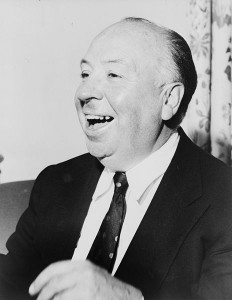 Alfred Hitchcock made 57 films throughout his career, and won exactly one Oscar. It wasn’t even for Best Director–it was an Irving G. Thalberg Memorial Award that the Academy gave him in 1968, one of those affairs that usually starts with an introduction bringing up all kinds of the recipient’s accomplishments. Had he gotten it a few decades later, this might’ve come in the form of a clip show that would’ve summed up a lifetime of achievements in three minutes (that scene where the airplane advances on Cary Grant in North by Northwest clocks in at about four minutes by itself).
Alfred Hitchcock made 57 films throughout his career, and won exactly one Oscar. It wasn’t even for Best Director–it was an Irving G. Thalberg Memorial Award that the Academy gave him in 1968, one of those affairs that usually starts with an introduction bringing up all kinds of the recipient’s accomplishments. Had he gotten it a few decades later, this might’ve come in the form of a clip show that would’ve summed up a lifetime of achievements in three minutes (that scene where the airplane advances on Cary Grant in North by Northwest clocks in at about four minutes by itself).
Instead, Hitchcock got an introduction from Robert Wise, a filmmaker who took home the same award the year before. When he talked about a couple of the movies that earned Hitchcock his award, they were the ones people usually think of whenever his name comes up: Psycho, Rear Window, Spellbound, Lifeboat, Rebecca, The Lady Vanishes. “When you examine a list of his films, you are jolted by the legion of absolutely top-level entertainments he has made–a record almost unmatched by any director practicing his magic anywhere,†Wise said.
Much like the name of the man responsible for them, a great deal of those titles have become immortal. Not all of Hitchcock’s movies have as many admirers as Strangers on a Train or Vertigo, though–try to remember the last time you heard someone talk about The Farmer’s Wife or The Lodger: A Story of the London Fog, or any of the seven other Hitchcock movies that the British Film Institute hopes it can get people to take more seriously. Part of the reason that they’re so obscure is that, with one exception, they’re all relics from the silent era that aren’t nearly as ambitious as some of the films he worked on later (think of all those avian actors he had to deal with on the set of The Birds).
Considering how long ago Hitchcock made these films, you can imagine the condition they’re in. Restoring them would be a pretty expensive process, but with the BFI’s new “Rescue the Hitchcock 9†campaign underway, lots of generous movie buffs have started the ball rolling.
“We are dependent on receiving funds from the general public, and we have had interest and support from all over the world since the project was announced,†said Brian Robinson, the communications manager at BFI. “There have been no full restorations of Hitchcock’s silent films to the standards of the digital age, and our preservation copies need to be upgraded.â€
At least eight of them should be ready by 2012, although chances are nobody’s going to see the ninth one anytime soon. In fact, few people have seen The Mountain Eagle at all–prints of it have been missing for generations. At this late date, trying to locate one may well be a fool’s errand, but Robinson said it’s still worth keeping an eye out for.
“There is no evidence that the film exists, but [that] doesn’t make it any less desirable for an archive,†he said. “Many films have been rediscovered after a long gap, most recently in the case of Metropolis–a complete version of the film turned up in South America.â€
The funny thing about all the attention these movies are getting is how critics treated them back when they were new. In fewer than 80 words, Variety panned The Manxman with a review that called it an “antiquated adaptation of [a] best seller of another day,†and said the “story is unfolded in a stupid, elementary way.†Stupid or not, the BFI wants to raise 100,000 pounds to fix it.
David Shawrtz, the chief curator at the Museum of the Moving Image, said it took a while for some critics to warm up to Hitchcock. “Some of the reviews of the time suggest that he was perceived as a somewhat superficial, technique-oriented director–a characterization that followed him throughout his career, until critics in the 1950s and 1960s started to take him very seriously,†he said. “He had a strong, graphic visual style from the beginning, and he knew how to connect with an audience.â€
Besides, when you’re dealing with a name as big as Hitchcock, it’s interesting to see what kind of work he did before he got famous. Professor Timothy Corrigan, who teaches cinema studies at the University of Pennsylvania, can see why these titles are so intriguing.
“The early work of any artist/filmmaker will reveal important insights about the later work,†he said. “It’s absolutely worth restoring.â€
Anybody who’s seen these movies may have noticed how infrequently the action stops so that a title screen can explain what’s going on. Dialogue was always secondary for Hitchcock, as you can tell by the acceptance speech he gave at the Oscars. He came onstage to the familiar tune of Funeral March of a Marionette, the piece that used to open every episode of Alfred Hitchcock Presents. After Wise handed him the award, Hitchcock leaned into the microphone, said, “Thank you very much indeed†… and left.
If you’d like to contribute to this project, visit www.bfi.org.uk/saveafilm.html.
This article was originally published on AllMediaNy.com

Leave a Reply